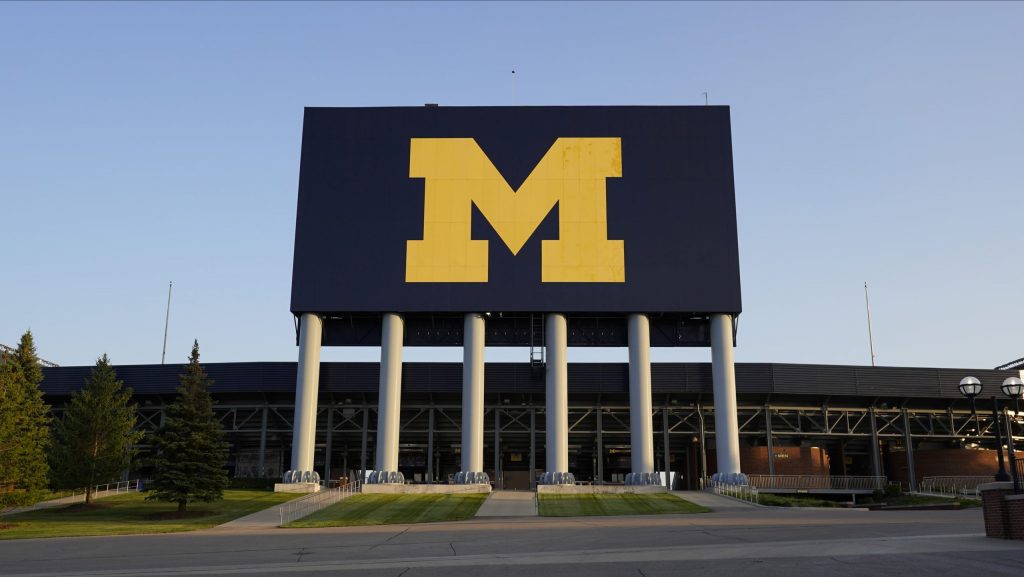Future of DEI at University of Michigan under the microscope
Bre'Anna Tinsley December 29, 2024U-M Regent Sarah Hubbard says the board is taking a “critical look” at university spending on Diversity, Equity and Inclusion programs.

The University of Michigan football stadium is shown in Ann Arbor, Mich., Thursday, Aug. 13, 2020.
There’s a lot of attention on Diversity, Equity, and Inclusion (DEI) programs at universities across the country.
President-elect Donald Trump has vowed to ban DEI at universities and businesses. And after a scathing New York Times article characterized DEI at the University of Michigan as a failure, concerns are high about what’s next for DEI on campus.
Not long after, the university’s Board of Regents held a private meeting to discuss DEI’s future. Regent Sarah Hubbard later appeared on “Fox and Friends,” saying the board was taking a “critical look” at DEI programs and spending.
U-M’s university-wide DEI strategy is aimed at increasing diversity and making the campus more inclusive. Programs like the Go Blue Guarantee —which provides free tuition to in-state students under a certain income level —and Wolverine Pathways, which offers educational support for grade school students, are part of the university’s DEI initiatives.
“We’ve spent a significant amount of money, more than just about any other university in the country, pushing behind these DEI programs,” Hubbard said. “And we really need to understand if we’re getting what we want out of that investment.”
– University of Michigan Regent Sarah Hubbard
DEI also supports resources like non-binary bathrooms, accommodations for disabilities, and tools for students facing discrimination. There’s even a push to diversify who the university accepts donations from.
But Hubbard says the board is questioning whether these initiatives are actually making a difference.
“We’ve spent a significant amount of money, more than just about any other university in the country, pushing behind these DEI programs,” Hubbard said. “And we really need to understand if we’re getting what we want out of that investment.”
All of this has left students, faculty, and staff uncertain about the future of DEI.
“There is kind of a multi-dimensional or layered context to where these concerns are coming,” said Mariel Krupansky, a lecturer at U-M.
She says part of the tension comes from Hubbard’s public comments about defunding DEI — but there’s more to it.
Recently, Provost Laurie McCauley decided to eliminate diversity statements from faculty hiring and promotion processes. Those statements were meant to reflect someone’s commitment to DEI, but McCauley — with input from an eight-person committee — said they put too much pressure on faculty to take specific stances on moral and political issues.
“It’s not just that decision,” Krupansky added, “it’s the larger context in which it was made and how it’s being portrayed to the public.”
At the Dec. 5, 2024 Board of Regents meeting, students and faculty spoke out, asking the board not to cut any DEI programs. Regent Michael Behm was direct in his response.
“I don’t know where these assumptions have come from,” Behm said. “I think we just want you to know there are no plans to make any cuts to any of those programs.”
But some students and faculty are still uneasy, especially as a new presidential administration that has openly rejected DEI takes office next month.
President-elect Trump has vowed to ban DEI and eliminate the Department of Education. Vice President-elect J.D. Vance has called DEI divisive and introduced the “Dismantle DEI Act” earlier this year.
Melissa Borja, an associate professor of American culture, says she was reassured by the Board of Regents’ response to student and faculty concerns.
“Our community is at its best when we lean into our core values — being bold, being courageous, and being truthful,” she said. “And when we focus on our core missions of research, teaching, and serving the people of Michigan.”
Robert Sellers, a professor of psychology and U-M’s first chief diversity officer, says the university has weathered similar challenges before.
“For 20-plus years, Michigan has been fighting issues related to anti-affirmative action,” he said. “We’ve developed DEI in a way that’s legal, always legal. It would be up to the president to define what part of our DEI initiatives isn’t.”
For now, the Board of Regents says it’s staying the course and keeping an eye on what’s to come.

